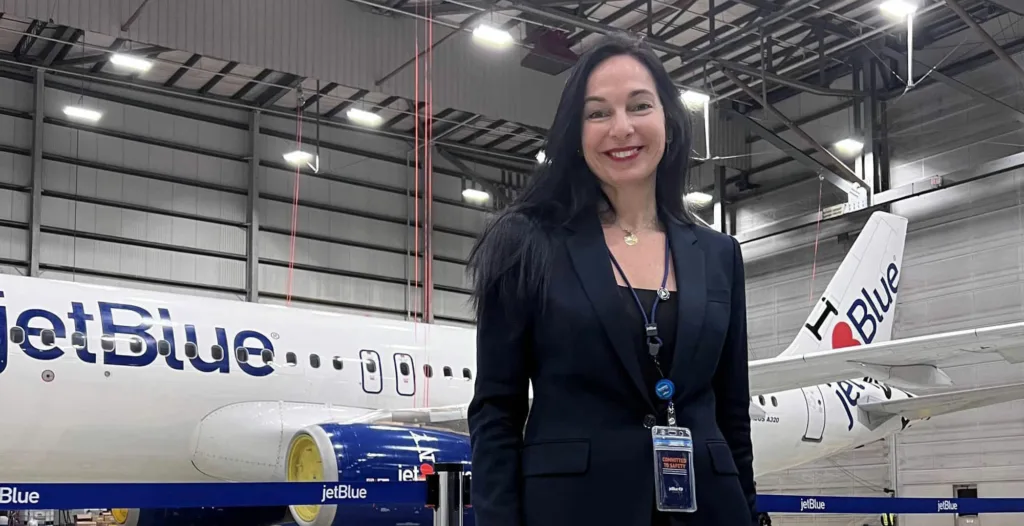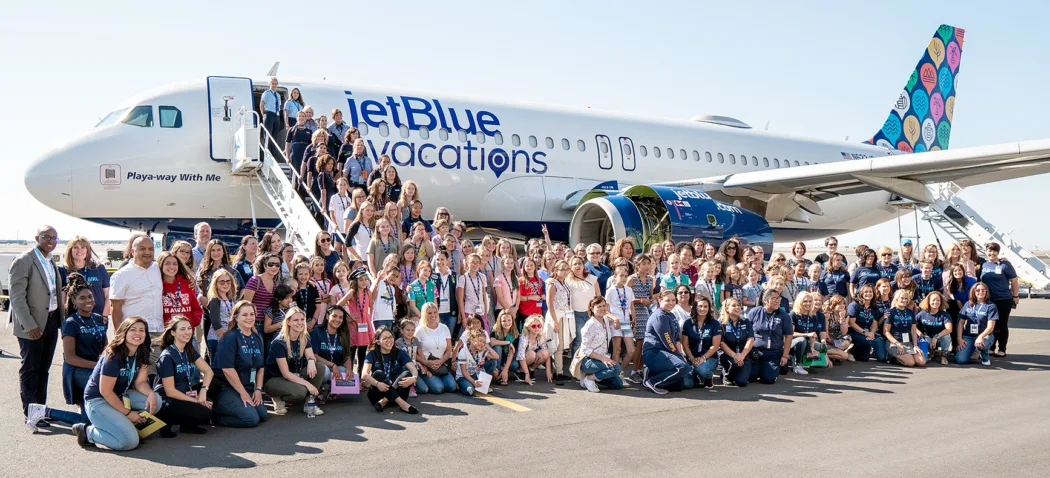Can you tell us about yourself?
My name is Maja Gedosev, and I’m the General Manager for Europe at JetBlue. I was born in Belgrade, Serbia, and I left when I was 16. I went to live in Germany and went on to study Hospitality and Tourism Management in Switzerland.
After that, I actually started my career in hospitality management with Hyatt International Hotels. I worked with them in Hong Kong and in Germany, and somewhere along the line, I felt like I needed to do something more in terms of education and building my knowledge. This is when I went on to do MBA studies. I worked at Lufthansa, which was my first brush with the aviation world; I think it left a huge impact on me.
I enjoyed the dynamics of airport operations. I felt like it was the best thing that could have happened to me because I always loved the service industry. I was loving everything about travel, learning about different cultures and about experiences that the travel industry offers.
Right after I finished my MBA studies, I actually wandered off into a few other directions. I worked a little bit in the financial sector and then I came back to the aviation world again, about nine years ago. I worked for Etihad Aviation Group, then I worked for Flybe as the Corporate Affairs Director. While there, I met the CEO of JetBlue at one of the aviation events, and this is now my fourth year at the company. So, pretty exciting!

My role at JetBlue is to oversee the expansion of markets across the pond. I look after commercial stakeholder management, trade marketing, travel trade with our industry associations and partners and, of course, lead a team of sales professionals. Jetblue now has teams in the UK, France and the Netherlands. These are the three key markets that are currently online. We are now also working on a few new markets that we will expand to across Europe – which is super exciting.
JetBlue only started two years ago, and today, we have five daily flights between the US and the UK, we have one daily between JFK and Paris, we just launched JFK to Amsterdam and are starting Boston to Amsterdam this September.
Going to eight daily flights in just two years is a huge feat, especially after the pandemic and the challenges it created for the supply chain and the aviation industry in general – I think it’s pretty cool.
Two other key important facts about me – I have two daughters, who are 18 and 15. I have two dogs, as well!
Tell us about JetBlue and how important sustainability is to you? Could you highlight some of the key sustainability efforts JetBlue has undertaken?
Like many airlines, sustainability is extremely important to JetBlue. It’s important because it’s not about competing, it’s about everybody making a joint effort to ensure that we address CO2 emissions and the impact they have on our environment. A lot of people have this misconception that aviation is the worst for CO2 emissions, but we are just a 2% contributor to all of the emissions altogether, globally. However we feel as an industry that we must be doing our bit for sustainability.
We offset all of our flights, domestically and internationally; this was an intermediary step to more concrete measures that are going to yield better results for the industry and the world. However, we know that it’s not the solution. So, right now we are focused on investing in the supply of sustainable aviation fuel, SAF, which is actually the right way to go forward.
SAF is rare, hard to supply and the price is very high, but we are working on our commitments to ensure that by 2030 – a target that is probably 10 years’ more ambitious than anyone else in the industry – we have SAF making up about 10% of our total fuel use for our operations.
We’ve already signed some deals with suppliers, mostly in the US. It is challenging to supply SAF on this side of the pond and our operation is pretty small, but still, we work with particular airports where we operate to ensure that we commit to SAF supply, and that we grow our SAF supply in those markets as well.
Besides that, I think it’s important to mention our onboard experience in terms of environmental impact. For example, the onboard supplies that are part of our catering experience, our amenities and the overall onboard experience, are recyclable or made out of recycled materials. Secondly, we also have operational measures for pilots that dictate how fuel will be spent. An example here would be when we’re taxiing an aircraft; we taxi with one engine on instead of two, which is best practice out there. We don’t want your plane to be producing noise or pollution while on the ground.
How do you balance those commitments while growing the airline at the same time?
We are growing in a few different ways. Firstly, we have an order book of aircraft that are going to be delivered to us in the next two to four years for our transatlantic operation. This will mean we have an additional 20 aircraft in the pipeline.
To be more precise, the new aircraft will be the latest generation of the Airbus A 321 Neo, which are actually more sustainable, environmentally friendly and efficient than any other aircraft out there. In fact, they’re more efficient by 30% when it comes to fuel and noise efficiency. We are also continually refurbishing the existing fleet and working on improvements.
JetBlue is also in the process of acquiring another airline, whose fleet is about two thirds of the size that we have already. So, it will definitely lead to us being a much bigger airline with a greater footprint in terms of network and destinations. That being said, all of the sustainability procedures that I’ve mentioned are going to apply to our greater, bigger airline.
Does JetBlue have any initiatives to support women in leadership roles/how important is gender diversity for the workforce?
Well, first of all, we have one of the most diverse leadership teams in the aviation world, both when it comes to gender diversity and diversity in general. We have the most female leaders in top roles; our President and Chief Operating Officer, Chief Financial Officer, Chief Digital and Technology Officer, Chief People Officer and Chief Strategy and Business Development Officer are all female roles. We’ve also appointed a woman who is running our JetBlue University as well.
We also have particular female leaders that are there to inspire the next new generation. When we talk about the new generation, we have created different activities and actions within the industry that actually create that future talent.
An example of this is our programme called Fly Like a Girl. It’s fantastic, because we are able to offer young girls time within our airline to experience different roles, from engineering and maintenance to pilot and leadership roles as well as office support roles.

We have also partnered with a charity called Inspire, and we just completed three weeks of work experience where we support children. This is not just gender related, but instead aimed at children with difficult circumstances who may not typically get to go on a plane or see the kind of roles that aviation offers. Here we gave them the opportunity to spend time with us, shadowing our crewmembers, gaining experience, exploring the cockpit, and spending time with the pilots. We also do a lot of sessions in schools where we talk to the students and give advice. It’s not always related to just aviation; it’s also advising young people on how they should choose their career path.
We also have a much bigger agenda when it comes to diversity and inclusion. Firstly, we have Blue Abilities; this is one that we just recently launched, and it celebrates and supports crew members with visible and non-visible disabilities. Then we have Blue Aviation which celebrates the heritage of Asians, Asian Americans and Pacific Islanders. During the pandemic there were a lot of challenges for this particular group, so I think this was critical for us to set up. We also have BlueConexion, which shares the Latino culture and language in the workplace and community. As well as these we have the African Diaspora, JetPride, SAJE (South Asian JetBlue Experience), Vets in Blue and Women in Flight.
(Find out more about JetBlue Crewmember Resource Groups here)
What advice do you have for aspiring young women looking to pursue a career in aviation?
It all begins with passion and love for the work that you do! There are no limits, I never thought inside of the box, and nobody should. I think people need to believe that everything is possible, and then you can really just do it all. I never had any serious challenges that I wasn’t able to overcome. But, along the way it is really important to build confidence among all genders. It’s not just about women talking together, it’s important to identify those male allies that can help and support and work closely with them to ensure that they recognise their value and that they’re also able to be ambassadors to your ambitions and role.
As much as we want to bond with each other as female professionals in industry, it is critical that we bring male colleagues on the journey as well. That’s my key advice. You will always run into some kind of stumbling block but if there’s a will there is always a way to get through it.
How does JetBlue align with the business enabler of the year?
Our philosophy as an airline is that we want to enter the market and disrupt. We like to bring with us fantastic quality products.
For example, low prices. I want to say low prices as we’re not a low-cost airline, we’re a low price value airline; that means that we do not compromise the quality of the product to offer the low price. We give our customers both and we consider that to disrupt the entire market. How that happens is: if we come into the market, and we put out a low price and a great product, our competition will want to follow and match or maybe even undercut, which means that both our customers benefit, those that fly JetBlue for the low fares, but also the competitors as they will still continue to fly customers. When they match our lower fare, they will then be offering that lower fare to their own customers so actually the entire market benefits from this entry.
We consider business enablers to be disruptors that bring in new fresh ideas on how business can be done differently. For instance, how they use new technology or how they use everything current in the business world. We consider ourselves aligning well with that, because of the similar philosophy that sits in the background of our decisions.
What are you looking for when judging The JetBlue Business Enabler of the Year?
Everything is about the market and the customer. For us, the JetBlue customer experience is critical, it all starts with the customer. I think that finalists have to be thinking about the core of their plan and what they’re trying to achieve. For example, how is that built around the customer? Is it answering to the customer’s demands and expectations? Is it bringing value? That’s the starting point.
Then in the background is the entire idea surrounding the business plan, which includes the finances and a well-thought-out path to actually bring the company’s service or product to the market. It’s all about how they will be rolling this out. In addition, JetBlue is always looking for innovation!

